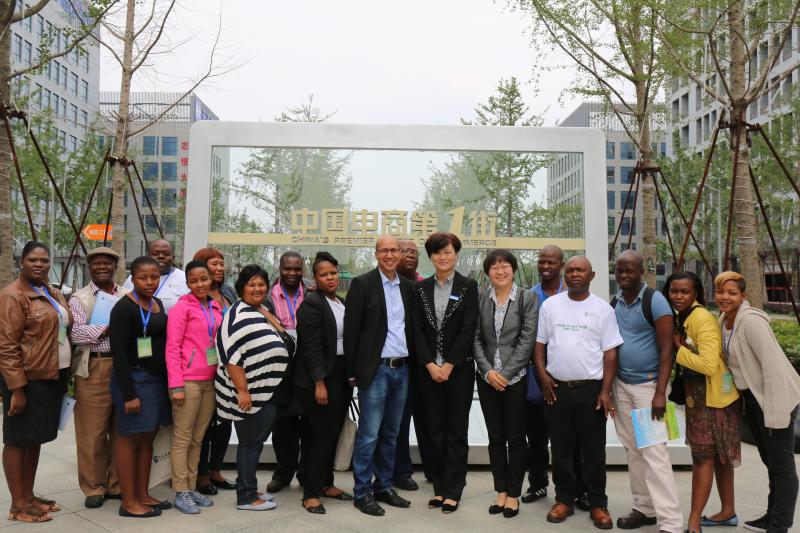China has made tremendous contribution to the implementation of the United Nations Millennium Development Goals, which is the consensus among the whole world. According to The Millennium Development Goals Report 2015 published by the UN, in 1990, global population living in poverty with less than $1.25 consumed per day accounted for about half of the total population of developing countries; while the number dropped to 14% in 2015.

International training program participants visiting an e-commerce village in Suqian City, Jiangsu Province.
This means that the number of people living in extreme poverty globally dropped from 1.9 billion to 836 million, reducing by over a half. With more than one billion people escaping extreme poverty, this is undoubtedly a worldwide feat. The report also points out that the proportion of China’s extremely poor population dropped miraculously from 61% in 1990 to 4% in 2015, making a great contribution to the global eradication of poverty.
There are many reasons leading to China’s significant achievements in eradicating poverty. Since the reform and opening-up, China’s rapid economic development with a double-digit growth rate for many years has allowed significant increase of the income among the poor.
The “trickle-down effect” in economics means that upper classes or regions benefit the lower through consumption, employment, etc., and promote their development and prosperity. The “targeted poverty alleviation” policy now carried out by the Chinese government is in line with this trend.
In carrying out the policy, the government generally starts with massive infrastructure construction in impoverished areas, and then introduce small-amount loans to promote the revitalization of agriculture – the main industry in rural areas. The implementation and promotion of China’s targeted poverty alleviation policy can be said to be the main reason for the great achievements in poverty reduction. China also leverages information technologies such as “Internet+” and big data to eradicate poverty, which is an approach with Chinese characteristics.
The key to eradicating poverty lies in employment, and getting the poor to enter the labor market is the best solution for effective and sustainable poverty eradication, which has been made a reality thanks to e-commerce and social services. There have been new phenomena in China’s poverty alleviation in recent years, such as building Taobao villages in rural areas and selling high-quality local products online, which have made great contributions to raising farmers’ income. Such online platforms and new forms of infrastructure services like rural logistics create new opportunities for poverty eradication and have enormous potential. Besides, this model provides opportunities for young people who have left their villages to return to their hometowns and start their own businesses, and also has a virtuous circle by increasing employment and income.
So far, great progress has been made in poverty elimination through the use of Internet. In the medium to long term, greater progress will be made by bringing the poor areas into the logistics market system.
Poverty alleviation through developing local industries is China’s most innovative solution to poverty eradication, which has enormous potential. It is expected that China’s solutions and experience in poverty eradication can provide reference for other developing countries with still many people living in poverty.
In its “13th Five-Year Plan” (2016-2020), China placed much more emphasis on domestic poverty and set the targets that all rural residents falling below China’s current poverty line will be able to lift themselves out of poverty, that all poor counties will be able to rid themselves of poverty, and that poverty alleviation will be achieved in all regions by 2020. The Chinese government is still working hard to achieve this goal, and global poverty alleviation still requires the efforts of various countries. I believe that China will surely achieve a lot in both domestic and global poverty alleviation.
Miyazaki Suguru is a senior representative, JICA China Office.
Opinion articles reflect the views of their authors only, not necessarily those of China.org.cn/Chinagate.cn.